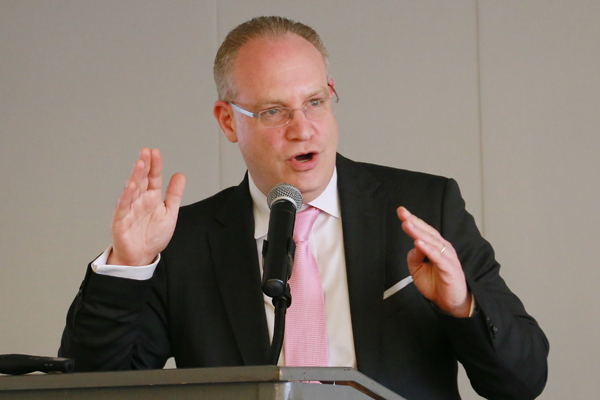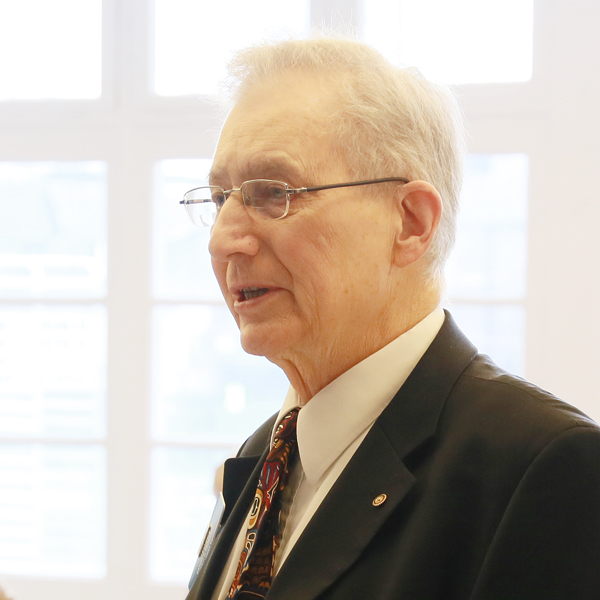Dr. Ronald D. Cohn - Interventional Genomics, A New Era on the Horizon

Joe introduced Dr. Ronald Cohn who comes to Toronto via the University of Essen in Germany and post-graduate training at Johns Hopkins University. He is currently the Chair of pediatrics at both the Hospital for Sick Children and at the University of Toronto. Dr. Cohn is the recipient of numerous awards including the National Institutes of Health young innovator’s award. Toronto is privileged to have him working here.
After a lightning review of the history genetics, Dr. Cohn mentioned some current paradigm shifts in genetics, beginning with the publication of the human genome in the journals Nature and Science. Other projects include: the HapMap project which studied 270 individuals and determined that 90% of the human genome is identical in all subjects while 1% of the genome differentiates us from one another. Another later study found that many of us have missing genes but that it is not always important.
He highlighted how some of his patients have impacted his approach to working with families and his research. He spoke of a child with a multiple problems whom he had been unable to diagnose and whose mother was anxious for a diagnosis especially after her 3rd child showed similar symptoms. When a diagnosis was finally found it was a significant relief for the family. In his current work Dr Cohn has continued his research by sequencing the genome of a cohort of his undiagnosed patients. In many cases all Dr. Cohn can do is attempt a diagnosis: treatment is often impossible. However, it is now possible to consider using interventional genomics using CRISPR technology which can be used to edit the genome and perhaps eventually affect a cure.
First announced in 2012, CRISPR was immediately hailed as a potential Nobel Prize winning technology. CRISPR is genetic surgery which cuts out pieces of abnormal DNA and then takes advantage of the normal DNA repair mechanism present in cell to repair that defect, a process the body does on its own initiative. There is great potential for this technique to be used by the pharmaceutical industry.
Duchenne muscular dystrophy is a debilitating genetic condition affecting only males which over time presents with ongoing muscle tissue deterioration. In lab experiments with mice, Dr. Cohn’s team has been able to apply CRISPR techniques to the “lines” in the genes and has seen improvement in the condition of the muscles of the mice. This has not yet been able to translate to the treatment of humans with the disease. The problem remains that the genetic dysfunction is unique to each individual; developing a single therapy for all those with the condition may not be possible.
CRISPR is used to “up regulate genes that compensate for the original mutated gene” and Dr. Cohn’s lab is experimenting with making defective mice walk again. He is also taking current developments to industry to see if a cure can be developed. He cited one patient who expressed great interest in having treatment just for the muscles of his thumbs, as despite significant loss of use of many muscles in the body he could still be able to participate and be functional by using technology applied just to his thumbs. Such a successful treatment could make a profound difference in the lives of individuals with Duchenne muscular dystrophy. However, caution in applying techniques to cure genetic conditions prenatally must be exercised because any results or consequences, including potentially deleterious effects, would be passed on to all the descendants of those with the condition.
If you are interested in learning more, a great place to start is Jennifer Doudna and Samuel Sternberg’s book “A Crack in Creation: Gene Editing and the Unthinkable Power to Control Evolution”. To purchase a hard copy, or download for Kindle Click Here!
George thanked our speaker.

.jpg)